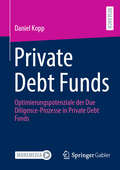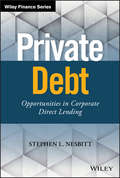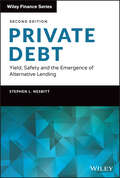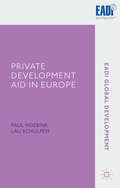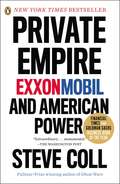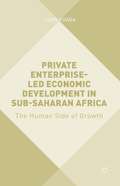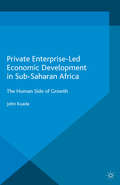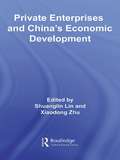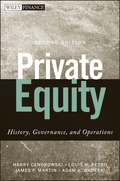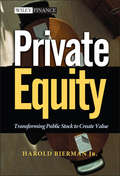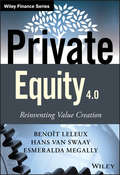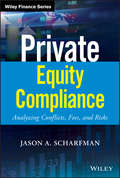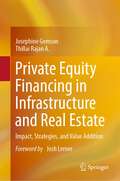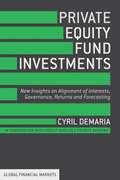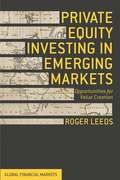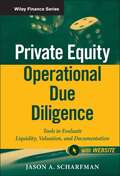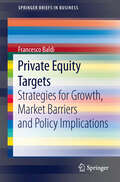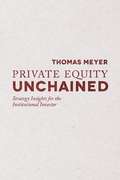- Table View
- List View
Private Debt Funds: Optimierungspotenziale der Due Diligence-Prozesse in Private Debt Fonds
by Daniel KoppDiese Studie gibt einen umfassenden Überblick in die Arbeit von Private Debt Fonds, die historischen Marktentwicklungen sowie die regulatorischen Gegebenheiten innerhalb welcher sich Private Debt Fonds und deren Investoren bewegen. In diesem Zusammenhang ergibt sich die Fragestellung, welche Stärken und Schwächen die verwendeten Due Diligence-Verfahren der Private Debt Fonds innehaben und welche Verbesserungsoptionen für bestimmte Arten von Private Debt Fonds zur Erreichung ihrer strategischen Zielsetzungen empfehlenswert sind. Auf Grundlage einer umfassenden Studie werden hier die Haupteinflussfaktoren der Due-Diligence-Qualität in Private Debt Fonds vorgestellt und analysiert.
Private Debt: Opportunities in Corporate Direct Lending (Wiley Finance)
by Stephen L. NesbittPrivate Debt: Opportunities in Corporate Direct Lending provides investors with a single, comprehensive resource for understanding this asset class amidst an environment of tremendous growth. Traditionally a niche asset class pre-crisis, corporate direct lending has become an increasingly important allocation for institutional investors—assets managed by Business Development Company structures, which represent 25% of the asset class, have experienced over 600% growth since 2008 to become a $91 billion market. Middle market direct lending has traditionally been relegated to commercial banks, but onerous Dodd-Frank regulation has opened the opportunity for private asset managers to replace banks as corporate lenders; as direct loans have thus far escaped the low rates that decimate yield, this asset class has become an increasingly attractive option for institutional and retail investors. This book dissects direct loans as a class, providing the critical background information needed in order to work effectively with these assets.
Private Debt: Yield, Safety and the Emergence of Alternative Lending (Wiley Finance)
by Stephen L. NesbittAn essential resource for creating outsized returns in the private debt markets In Private Debt II: Finding Yield in a Zero Interest World, renowned investment advisor and industry leader Stephen Nesbitt delivers yet another essential resource for investors seeking to acquire private debt options in the investment market, including corporate direct lending, asset-backed lending, mezzanine lending, royalties, venture debt, structured credit (CLOs), specialty finance, and structured equity. Building on the success and popularity of Private Debt: Opportunities in Corporate Direct Lending, this latest edition of the author’s flagship text helps readers understand this complex and rapidly growing asset class. The book also offers: Explorations of the opportunities, relevant risks, and historical yield provided by private debt Discussions of a variety of loan investment vehicles, including the Business Development Company structure Strategies for structuring a direct loan portfolio and how to fit it into your overall investment strategyA can’t-miss resource for serious investors looking for opportunities to earn higher yields than those offered by traditional index funds while still retaining reasonable safety of principle and liquidity, Private Debt II will undoubtedly become the go-to guide for anyone looking for tried and tested debt investment strategies.
Private Development Aid in Europe
by Paul Hoebink Lau SchulpenThe authors present anoverview of private development aid in Belgium, Denmark, Finland, France, Ireland, Italy, the Netherlands, Spain, and the EU as a whole. They illustrate how private aid organisations receive support as well as the relations they have with their respective governments. "
Private Development Aid in Europe: Foreign Aid between the Public and the Private Domain (EADI Global Development Series)
by Paul HoebinkThe authors present an overview of private development aid in Belgium, Denmark, Finland, France, Ireland, Italy, the Netherlands, Spain, and the EU as a whole. They illustrate how private aid organisations receive support as well as the relations they have with their respective governments.
Private Empire
by Steve CollAn "extraordinary" and "monumental" exposé of Big Oil from two-time Pulitzer Prize winner Steve Coll (The Washington Post) In this, the first hard-hitting examination of ExxonMobil--the largest and most powerful private corporation in the United States--Steve Coll reveals the true extent of its power. Private Empire pulls back the curtain, tracking the corporation's recent history and its central role on the world stage, beginning with the Exxon Valdez accident in 1989 and leading to the Deepwater Horizon oil spill in the Gulf of Mexico in 2010. The action spans the globe--featuring kidnapping cases, civil wars, and high-stakes struggles at the Kremlin--and the narrative is driven by larger-than-life characters, including corporate legend Lee "Iron Ass" Raymond, ExxonMobil's chief executive until 2005. A penetrating, news-breaking study, Private Empire is a defining portrait of Big Oil in American politics and foreign policy.
Private Empire
by Steve CollAn "extraordinary" and "monumental" exposé of Big Oil from two-time Pulitzer Prize winner Steve Coll (The Washington Post)In this, the first hard-hitting examination of ExxonMobil--the largest and most powerful private corporation in the United States--Steve Coll reveals the true extent of its power. Private Empire pulls back the curtain, tracking the corporation's recent history and its central role on the world stage, beginning with the Exxon Valdez accident in 1989 and leading to the Deepwater Horizon oil spill in the Gulf of Mexico in 2010. The action spans the globe--featuring kidnapping cases, civil wars, and high-stakes struggles at the Kremlin--and the narrative is driven by larger-than-life characters, including corporate legend Lee "Iron Ass" Raymond, ExxonMobil's chief executive until 2005. A penetrating, news-breaking study, Private Empire is a defining portrait of Big Oil in American politics and foreign policy.
Private Empire
by Steve CollAn "extraordinary" and "monumental" exposé of Big Oil from two-time Pulitzer Prize winner Steve Coll (The Washington Post) In this, the first hard-hitting examination of ExxonMobil--the largest and most powerful private corporation in the United States--Steve Coll reveals the true extent of its power. Private Empire pulls back the curtain, tracking the corporation's recent history and its central role on the world stage, beginning with the Exxon Valdez accident in 1989 and leading to the Deepwater Horizon oil spill in the Gulf of Mexico in 2010. The action spans the globe--featuring kidnapping cases, civil wars, and high-stakes struggles at the Kremlin--and the narrative is driven by larger-than-life characters, including corporate legend Lee "Iron Ass" Raymond, ExxonMobil's chief executive until 2005. A penetrating, news-breaking study, Private Empire is a defining portrait of Big Oil in American politics and foreign policy.
Private Enterprise-Led Economic Development in Sub-Saharan Africa: The Human Side of Growth
by John KuadaPrivate Enterprise-Led Development in Sub-Saharan Africa provides a novel theoretical and conceptual model to guide research into Africa's economic development. It endorses the view that private enterprise-led growth will help reduce poverty since it strengthens individuals' capacity to care for themselves and their families.
Private Enterprise-Led Economic Development in Sub-Saharan Africa: The Human Side of Growth
by John KuadaPrivate Enterprise-Led Development in Sub-Saharan Africa provides a novel theoretical and conceptual model to guide research into Africa's economic development. It endorses the view that private enterprise-led growth will help reduce poverty since it strengthens individuals' capacity to care for themselves and their families.
Private Enterprises and China's Economic Development (Routledge Studies in the Growth Economies of Asia)
by Xiaodong Zhu Shuanglin LinPrivate enterprises have contributed significantly to China's recent economic growth and will play a key role in achieving China's goal of building a comprehensively well-society. But how can private enterprises help China mitigate its macroeconomic problems such as unemployment, income inequality, financial disintermediation, and an unhealthy economic cycle? And what are the main obstacles to private enterprise development? Private Enterprises and China’s Economic Development answers these questions by identifying the range of cultural, political and financial challenges confronting China's private enterprises, and assessing their performance and potential. Contributors also analyse the experiences and lessons of other countries, and propose strategies and policies to help China promote private enterprise development. Using the most up to date research on private enterprises, including detailed econometric analysis and national representative data, authors including economists, policy-makers and academics from the USA, China, Singapore and Canada comprehensively address the most important aspects of China’s private enterprise development. As such this book will appeal to students, scholars and policy-makers alike with an interested in the Chinese economy, economic growth, comparative economics and transitional economics.
Private Equity
by Harry Cendrowski Adam A. Wadecki Louis W. Petro James P. MartinPraise for Private Equity"Private Equity: History, Governance, and Operations is an invaluable guide to understanding the world of private equity investing. Harry Cendrowski and his colleagues have drawn on their extensive experience and expertise to produce a book that is remarkably comprehensive and authoritative."--Robert Larson, Chairman, Lazard Real Estate Partners LLC and Larson Realty Group Managing Director, Lazard Alternative Investments"Private Equity: History, Governance, and Operations is an essential text for any business/finance professional's library. Applicable to both seasoned private equity gurus and students of the industry, its in-depth analysis of 'Best Practices' is well researched and clearly written."--William Campbell, Managing Director, W.Y. Campbell & Company"This is an interesting and very well-written book. It not only clearly describes the history and techniques of private equity investing, it also provides a thorough examination of the rarely appreciated relationships among internal control design and operation, corporate governance and sound investment decision-making and management. It is an important contribution to the literature of finance."--Barry Epstein, PhD, CPA, Partner, Russell Novak & Company, LLP, and author of Wiley GAAP 2008, The Handbook of Accounting and Auditing, and Wiley IFRS 2008"Harry Cendrowski really hits a homerun with his newest book about the private equity (PE) industry. A definitive, authoritative text on the subject, it answered all my questions, plus some, and gave me a complete frame of reference where I now feel well informed on PE. I would recommend this book to anyone connected to the PE industry, business advisors, academics, and business owners."--Parnell Black, MBA, CPA, CVA, Chief Executive Officer, National Association of Certified Valuation Analysts (NACVA)"The timing could not be better to learn more about the current best practices and governance in the world of private equity. What was once an exclusive asset class reserved for the largest, most sophisticated investors has now become a mainstream alternative investment option for investors of all sizes. Still, many investors do not fully understand how the business works. Private Equity: History, Governance, and Operations endows its readers with an A-to-Z education on this emerging asset class, irrespective of their previous experiences."--Maribeth S. Rahe, President and Chief Executive Officer, Fort Washington Investment Advisors, Inc. & Fort Washington Capital Partners"As a private equity practitioner in the financial services space, I found this book to be a comprehensive-and comprehendible-resource covering all relevant aspects of the business of private equity. This book provides valuable 'how-to's' for improving the likelihood of having successful portfolio companies, with successful exits. Furthermore, both veteran and prospective PE investors now have a resource available to help them screen PE opportunities that best fit with their risk and return objectives."--Scott B. McCallum, Principal, Resource Financial Institutions Group, Inc."For years, private equity has been a misunderstood asset class. Harry Cendrowski's book defines private equity in clear, concise terms. Anyone in the financial world will benefit from the insights, guidelines, and experiences detailed in Private Equity: History, Governance, and Operations."--Bob Clone, Senior Portfolio Manager, Alternative Investments Division, Michigan Department of Treasury
Private Equity
by Paul Jowett Francoise JowettThis tells the story of the development of the private equity industry in Germany. It is the first comprehensive history of the private equity industry for any country, revealing the vicissitudes of private equity investing, warts and all. It is anengaging chroniclefor anyone interested in the industry or the modern German economy. "
Private Equity
by Harold Bierman Jr.Praise for Private Equity"Harold Bierman has blended an excellent mix of important principles with real case study examples for a better understanding on a rather sophisticated finance subject."-Edward M. Dudley, Vice President & General Auditor, ABB Americas"The role of private equity firms in financing buyouts as well as providing growth capital has expanded significantly in the past decade. In a clear, concise way, Harold Bierman provides a timely and astute analysis of the virtues of private equity as well as creative quantitative methodologies that are applicable to real-life transactions. This book should become essential reading for investors, intermediaries, financial advisors and the management of private, almost private, or soon-to-be private firms."-James A. Rowan Jr., Managing Director, Investment BankingLegg Mason Wood Walker, Inc."As the private equity asset class has grown to over $300 billion in the last three years, Bierman analyzes the fundamentals behind the investment decisions of this increasingly important sector. Once completing the book, you will understand the fundamental analytical framework underlying private equity investment."-Peter Nolan, Partner, Leonard Green and Partners"In looking at the private equity arena, Professor Bierman has brought together a diverse group of metrics and valuation formulas into a single text. The book provides a valuable combination of academic theory and real-life case studies. It provides many insights."-Peter H. Vogel, Vice President, MeadWestvaco Corporation
Private Equity 4.0: Reinventing Value Creation (The Wiley Finance Series)
by Benoît Leleux Hans van Swaay Esmeralda Megally“Private equity is more economically significant than ever, as institutions hunt for high returns in a risky world. Private Equity 4.0 examines the role, workings and contribution of this important industry in a straightforward yet revealing manner.” Dr. Josh LernerJacob H. Schiff Professor of Investment Banking Chair, Entrepreneurial Management Unit Harvard Business School A multi-perspective look at private equity's inner workings Private Equity 4.0 provides an insider perspective on the private equity industry, and analyzes the fundamental evolution of the private equity asset class over the past 30 years, from alternative to mainstream. The book provides insightful interviews of key industry figures, and case studies of some of the success stories in the industry. It also answers key questions related to strategy, fund manager selection, incentive mechanisms, performance comparison, red flags in prospectuses, and more. Private Equity 4.0 offers guidance for the many stakeholders that could benefit from a more complete understanding of this special area of finance. Understand the industry's dominant business models Discover how value is created and performance measured Perform a deep dive into the ecosystem of professionals that make the industry hum, including the different incentive systems that support the industry's players Elaborate a clear set of guidelines to invest in the industry and deliver better performance Written by a team of authors that combine academic and industry expertise to produce a well-rounded perspective, this book details the inner workings of private equity and gives readers the background they need to feel confident about committing to this asset class. Coverage includes a historical perspective on the business models of the three major waves of private equity leading to today's 4.0 model, a detailed analysis of the industry today, as well as reflections on the future of private equity and prospective futures. It also provides readers with the analytical and financial tools to analyze a fund's performance, with clear explanations of the mechanisms, organizations, and individuals that make the system work. The authors demystify private equity by providing a balanced, but critical, review of its contributions and shortcomings and moving beyond the simplistic journalistic descriptions. Its ecosystem is complex and not recognizing that complexity leads to inappropriate judgments. Because of its assumed opacity and some historical deviant (and generally transient) practices, it has often been accused of evil intents, making it an ideal scapegoat in times of economic crisis, prodding leading politicians and regulators to intervene and demand changes in practices. Unfortunately, such actors were often responding to public calls for action rather than a thorough understanding of the factors at play in this complex interdependent system, doing often more harm than good in the process and depriving economies of one of their most dynamic and creative forces. Self-regulation has clearly shown its limits, but righteous political interventions even more so. Private equity investment can be a valuable addition to many portfolios, but investors need a clear understanding of the forces at work before committing to this asset class. With detailed explanations and expert insights, Private Equity 4.0 is a comprehensive guide to the industry ways and means that enables the reader to capture its richness and sustainability.
Private Equity Compliance: Analyzing Conflicts, Fees, and Risks (Wiley Finance)
by Jason A. ScharfmanDevelop and manage a private equity compliance program Compliance has become one of the fastest-growing areas in the private equity (PE) space. Mirroring trends from the hedge fund industry, recent surveys indicate that PE managers rank compliance as the single most challenging aspect of their business. Reports also indicate that PE compliance spending has rapidly outpaced other PE operating costs with recent estimates indicating that individual PE funds on average spend at least 15 - 20% of their operating budgets on this area. General Partners (GPs) have also significantly ramped up the hiring of private equity compliance related roles. Private Equity Compliance provides current and practical guidance on key private equity (PE) compliance challenges and trends. Packed with detailed, practical guidance on developing and managing a private equity compliance program, it offers up-to-date case studies and an analysis of critical regulatory enforcement actions on private equity funds in areas including conflict of interest, fees, expenses, LP fun raising disclosures, and valuations. • Provides real-world compliance guidance • Offers information that is tailored to the current compliance practices employed by GPs in the private equity industry. • Provides guidance on managing the compliance risks associated with cybersecurity and information technology risk • Serves as a PE-focused complement to the author's previous book, Hedge Fund Compliance If you’re a private equity investor or compliance officer looking for trusted guidance on analyzing conflicts, fees, and risks, this is one reference you can’t be without.
Private Equity Exits
by Paul A. Gompers Timothy DoreThis note presents statistics on private equity exits and discusses important issues relating to the most common exits routes.
Private Equity Finance Vignettes: 2016
by Paul A. Gompers Victoria IvashinaThis case contains four vignettes that provide an introduction to the issues covered in the course, Private Equity Finance.
Private Equity Financing in Infrastructure and Real Estate: Impact, Strategies, and Value Addition
by Josephine Gemson Thillai Rajan A.This book provides a comprehensive overview of Private Equity (PE) financing in the infrastructure and real estate sectors. In doing so, it analyzes the impact of such investments in the two sectors, evaluates the types of financing strategies, and explores the value created by such investments. Infrastructure and Real Estate have emerged as a significant asset class for PE investors. In the last three decades, PE firms have invested significant amounts of capital in infrastructure and real estate – sectors which did not feature in their radar before 2000. Between 2000 and 2009, PE firms invested more than USD 200 billion in infrastructure. Real estate sector also witnessed investments of a similar scale as that of infrastructure. Fundraising for infrastructure and real estate was about USD 100 billion and USD 150 billion respectively in 2019, setting new records and reaching all-time highs. This book examines such PE investments – both at a global level and at an emerging economy level, to identify how PE firms have created an impact with their investments, to provide both ready capital and value-addition to sectors which seem to urgently need both. The book is divided into three sections – impact of PE investments, strategies used by PE firms, and value created by such investments. The findings of this research and the corresponding best practices are useful and applicable to students, academicians, researchers, financial institutions, policy makers and law makers, commercial banks and funding agencies, practitioners, the Government, and other parties who are directly or indirectly associated with the development of infrastructure and real estate; and could aid funding agencies, practitioners and policy makers who are directly responsible for creating and developing infrastructure and real estate for their economies.
Private Equity Fund Investments
by Cyril DemariaThis book presents new, advanced, evidence-based guidance on investing in private equity funds: first by assessing the investor's environment and motivations, then by looking into the risks, returns and overall performance of funds and finally, by offering practical solutions to the illiquidity conundrum.
Private Equity Investing in Emerging Markets
by Roger Leeds Nadiya SatyamurthyIn Private Equity Investing in Emerging Markets, Roger Leeds illustrates how private equity is a tool uniquely suited to strengthening the value and performance of businesses in emerging market countries. Thus far underutilized in emerging markets, Leeds outlines how private equity can play a significantly larger role in the enhancement of both individual company performance and the private sector's overall contribution to economic growth and development. Drawing heavily on actual investor experiences, Leeds shows readers how the same inefficiencies and weaknesses that characterize business climates in emerging market countries also open the door to outsized opportunities for private equity investors. Informed by the author's nearly four decades as both a practitioner and academician working with private equity investors, entrepreneurs, and policymakers in over 100 developing countries, the book uses anecdotes and case studies to reinforce the key arguments for private equity investment in emerging economies. Among other illuminating examples and studies, Leeds provides detailed profiles of the private equity environment in China, Brazil, and Kenya. Private Equity Investing in Emerging Markets concludes by recommending specific actions by key stakeholders that would strengthen the future of private equity in emerging markets.
Private Equity Operational Due Diligence
by Jason A. ScharfmanA step-by-step guide to develop a flexible comprehensive operational due diligence program for private equity and real estate fundsAddressing the unique aspects and challenges associated with performing operational due diligence review of both private equity and real estate asset classes, this essential guide provides readers with the tools to develop a flexible comprehensive operational due diligence program for private equity and real estate. It includes techniques for analyzing fund legal documents and financial statements, as well as methods for evaluating operational risks concerning valuation methodologies, pricing documentation and illiquidity concerns.Covers topics including fund legal documents and financial statement analysis techniquesIncludes case studies in operational fraudCompanion website includes sample checklists, templates, spreadsheets, and links to laws and regulations referenced in the bookEquips investors with the tools to evaluate liquidity, valuation, and documentationAlso by Jason Scharfman: Hedge Fund Operational Due Diligence: Understanding the RisksFilled with case studies, this book is required reading for private equity and real estate investors, as well as fund managers and service providers, for performing due diligence on the noninvestment risks associated with private equity and real estate funds.
Private Equity Targets: Strategies for Growth, Market Barriers and Policy Implications
by Francesco BaldiEconomics of private equity (PE). Empirical evidence on Italian manufacturing firms resorting to internal equity only to finance investments with positive NPV. Normative framework providing guidelines on how their entrepreneurial model (governance, gearing, growth) would be favourably influenced by conventional PE actions. Policy recommendations on how to expedite PE ownership expansion in Italy and other European countries.
Private Equity Unchained: Strategy Insights For The Institutional Investor
by Thomas MeyerThere are significant returns to be made from private equity, infrastructure, real estate and other illiquid investments, but a competitive strategy is essential for investment success and for meeting objectives. This book takes readers through all the considerations of planning and implementing an investment strategy in illiquid investments.
